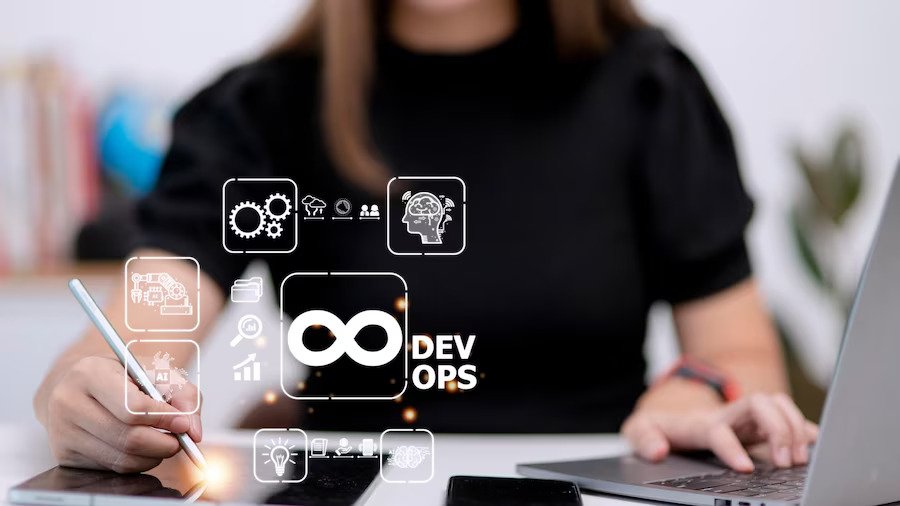In the modern digital landscape, the dynamics of software development have witnessed a significant shift. The adoption of DevOps has surged, paving the way for swift and efficient development cycles. Nonetheless, it’s critical to examine the significance of integrating security practices within these DevOps processes, specifically within the United States region, a frontrunner in embracing this technology.
Understanding DevOps Security
DevOps security aims to integrate security practices within the DevOps cycle, encompassing planning, coding, testing, and deployment. Key objectives include safeguarding the code, tools, and environments involved in the process. Automation plays a pivotal role in achieving this, automating security tests and checks to reduce human error and ensure consistency.
However, the implementation of DevOps security is not without its challenges. The major risks include code vulnerabilities, misconfigurations, and weak credentials. A study highlighted that 50% of organizations experienced a breach in the past three years due to these issues, underscoring the need for more robust security measures.
Securing the DevOps Pipeline
Security integration within the DevOps pipeline begins with threat modeling and risk assessment. This proactive approach helps teams identify potential vulnerabilities and design systems to counteract them.
Secure coding practices and static code analysis further bolster the pipeline security. Additionally, Continuous Integration and Continuous Delivery (CI/CD) processes need robust security practices to prevent breaches during the integration and deployment stages.
Container security and orchestration are another vital aspect. Containers offer a level of abstraction that simplifies application deployment, but they also present new security challenges. The same goes for Infrastructure as Code (IaC) – it improves efficiency but increases the risk surface.
Integrating Security into DevOps Processes
Effective integration of security within DevOps necessitates implementing security gates and controls in the CI/CD pipeline, leading to the birth of DevSecOps, which involves a culture of shared responsibility for security.
Automating security testing and vulnerability management becomes pivotal in this context, making it possible to detect and address security threats early. Additionally, secret management and secure credential storage are vital to protecting access keys, passwords, and other sensitive data.
Monitoring and incident response should be part of the DevOps process. Any deviation from normal patterns should trigger alerts and prompt investigations, while incident response plans ensure quick containment and recovery.
Compliance and Governance in DevOps
Aligning DevOps practices with regulatory requirements is a necessity for businesses, especially in regions like the United States with strict data privacy laws. An audit trail and change tracking in the DevOps environment help demonstrate compliance during audits.
Security controls for cloud-based DevOps environments ensure the integrity of data stored and processed in the cloud. Besides, data privacy considerations, like anonymizing personal data used in testing, become even more crucial.
Building a Security Culture in DevOps
Security is not just about tools and processes but also about people. Therefore, promoting security awareness and training across teams is critical. By establishing security champions and encouraging cross-functional collaboration, businesses can foster a proactive security culture.
Security reviews and secure coding guidelines help developers understand and apply security best practices. Moreover, learning from security incidents and continuously improving the practices ensure a robust and resilient DevOps environment.
Nurturing Trust Through Transparent DevOps Practices
In a rapidly evolving digital realm, trust becomes the cornerstone for any successful business model. Today’s discerning customers and partners seek transparency, a value strongly embedded within DevOps processes.
Transparent DevOps practices offer a window into the meticulous orchestration of various development and operations stages. By consistently sharing information and insights across teams, organizations foster an environment of mutual trust and cooperation. This transparency extends to software quality, release readiness, and the ability to diagnose and address issues swiftly.
However, transparency doesn’t stop within an organization’s boundaries. It extends to customers and other stakeholders, enabling them to understand the integrity of the software development processes and the measures taken to secure their data. This clear, open communication strengthens relationships, enhances reputations, and drives business growth.
Incorporating transparency into DevOps demands a blend of tools, practices, and culture. It means utilizing dashboards for real-time visibility, implementing open communication channels, and encouraging an open, collaborative culture. By doing so, businesses not only fortify their DevOps security but also nurture trust, a critical asset in today’s digitally interconnected world.
Future Trends and Emerging Technologies in DevOps Security
The future of DevOps security lies in leveraging emerging technologies. The potential impact of artificial intelligence and machine learning can revolutionize threat detection and response.
Serverless and microservices architectures also offer opportunities to enhance DevOps security. The concept of shift-left security, where security is considered at the earliest stages of the development process, will see a rise, aided by DevSecOps tools.
Finally, blockchain and distributed ledger technologies may be employed to enhance security in the DevOps process, ensuring transparency, accountability, and secure transactions.
In conclusion, fortifying the software development lifecycle through a comprehensive approach to DevOps security is not a choice, but a necessity for modern businesses. With the right practices and a culture of security awareness, businesses can leverage the benefits of DevOps without compromising on security.
Read Also:
- Product Managers’ Toolbox: Top-Rated Product Roadmap Management Software
- Revolutionizing ETL: How Low-Code Solutions Are Reshaping Data Integration
- Benefits Of Hiring A Salesforce Consulting Company
The post Fortifying The Software Development Lifecycle: A Comprehensive Guide To DevOps Security appeared first on Social Media Magazine.
